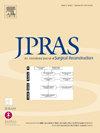乳房再造术中使用周围神经阻滞的种族差异:全国性分析
IF 2
3区 医学
Q2 SURGERY
Journal of Plastic Reconstructive and Aesthetic Surgery
Pub Date : 2024-09-19
DOI:10.1016/j.bjps.2024.09.054
引用次数: 0
摘要
在整形外科手术中使用周围神经阻滞(PNB)可减少术后阿片类药物的用量,并对乳房再造(BR)术后疼痛有好处。这项回顾性研究探讨了接受乳房再造术的患者在使用周围神经阻滞术进行术后镇痛时是否存在种族和族裔差异。研究利用美国外科学院国家外科质量改进计划数据库,纳入了在 2012-2021 年期间接受乳房再造术且除全身麻醉外还接受了 "区域 "麻醉的女性患者。没有种族和民族数据以及接受了其他额外麻醉的患者被排除在外。比较了不同种族-民族群体和麻醉方式之间的非加权 PNB 使用率。多变量逻辑回归评估了种族和民族是否与接受 PNBs 有独立关联。共有 25188 名患者接受了 BR,9429 名患者(37.4%)接受了 PNB 术后镇痛。患者的人口统计学特征在年龄和体重指数方面有统计学意义,但无临床意义。各组间的合并症无明显差异。与白人患者相比,黑人患者接受 PNB 的可能性较低(p < 0.001),而亚裔和其他族裔患者接受 PNB 的可能性较高(p < 0.001)。黑人患者在即刻种植型和自体 BR 以及延迟自体 BR 中接受 PNB 的可能性较低(p < 0.05)。与白人患者相比,亚裔患者更有可能在所有植入式乳房造口术中接受 PNB(p < 0.001)。种族对接受 PNB 没有明显影响。综上所述,在使用 PNB 用于 BR 术后镇痛方面存在种族差异。应提倡公平使用 PNB,以免扩大 BR 中的种族差异基线。本文章由计算机程序翻译,如有差异,请以英文原文为准。
Racial disparity in peripheral nerve block usage in breast reconstruction: A nationwide analysis
Peripheral nerve block (PNB) usage in plastic surgery is associated with reduction in post-operative opioid consumption and pain demonstrating benefits in breast reconstruction (BR). This retrospective study explored whether racial-ethnic disparities exist with PNB use for postoperative analgesia in patients undergoing BR.
Using the American College of Surgeons National Surgical Quality Improvement Program database, women who underwent BR from 2012–2021 and received “regional” in addition to general anesthesia were included in the study. Patients without race and ethnicity data and who received other additional anesthesia were excluded. Unweighted rates of PNB use were compared between racial-ethnic groups and BR modality. Multivariate logistic regression assessed whether race and ethnicity were independently associated with receiving PNBs.
A total of 25,188 patients underwent BR and 9429 patients (37.4%) received PNB for postoperative analgesia. Patient demographics reached statistical, but not clinical, significance in age and BMI. Comorbidities were not significantly different between groups. Black patients were less likely to receive PNBs (p < 0.001), while Asian and Other patients were more likely to receive PNBs compared to White patients (p < 0.001). Black patients were less likely to receive PNB in immediate implant-based and autologous BR, as well as delayed autologous (p < 0.05). Asian patients were more likely to receive PNB for all implant-based BR compared to White patients (p < 0.001). Ethnicity had no significant impact on receipt of PNB. As a conclusion, racial disparity exists in use of PNBs for postoperative analgesia in BR. Equitable access to PNBs should be championed to not augment baseline racial disparity in BR.
求助全文
通过发布文献求助,成功后即可免费获取论文全文。
去求助
来源期刊
CiteScore
3.10
自引率
11.10%
发文量
578
审稿时长
3.5 months
期刊介绍:
JPRAS An International Journal of Surgical Reconstruction is one of the world''s leading international journals, covering all the reconstructive and aesthetic aspects of plastic surgery.
The journal presents the latest surgical procedures with audit and outcome studies of new and established techniques in plastic surgery including: cleft lip and palate and other heads and neck surgery, hand surgery, lower limb trauma, burns, skin cancer, breast surgery and aesthetic surgery.

 求助内容:
求助内容: 应助结果提醒方式:
应助结果提醒方式:


